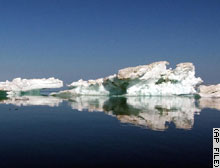 Arctic sea ice is melting at a rate far quicker than predicted by climate change computer models and could disappear completely before the middle of the century, scientists have warned. Arctic sea ice is melting at a rate far quicker than predicted by climate change computer models and could disappear completely before the middle of the century, scientists have warned.
The study, published in the latest edition of the journal Geophysical Research Letters, found that the actual rate at which summer sea ice had shrunk per decade during the past 50 years was more than three times faster than an average of 18 of the most highly regarded climate simulations.
Retreating Arctic ice is considered a key indicator of the pace of global warming by environmentalists, and one that could have devastating knock-on repercussions for the wider climate, including warmer oceans and rising sea levels.
Declining ice levels also poses a threat to Arctic wildlife including polar bears, walruses and ringed seals.
According to the Intergovernmental Panel on Climate Change, which releases the third of three reports into the causes, consequences and mitigation of global warming in Thailand this week, the Arctic could be ice-free in summer by the latter part of the 21st century.
But the research, conducted by the U.S.-based National Center for Atmospheric Research (NCAR) and the University of Colorado's National Snow and Ice Data Center (NSIDC), demonstrates that the 18 models on which the IPCC has based its current recommendations could already be out of date -- and that the retreat of the ice could already be 30 years ahead of the IPCC's worst case scenario.
"This suggests that current model projections may in fact provide a conservative estimate of future Arctic change, and that the summer Arctic sea ice may disappear considerably earlier than IPCC projections," said NSIDC's Julienne Stroeve who led the study.
Climate change models of Arctic sea ice cover in September, the month when ice is usually at its minimum, suggest an average loss of 2.5 percent of ice cover per decade from 1953 to 2003. The worst case simulated by an individual model predicted a decade-on-decade reduction of 5.4 percent.
Yet when scientists studied observable data for the same period, including shipping logs, aerial photos and satellite images, they discovered the actual figure for ice loss from 1953 until 2006 to be 7.8 percent.
Furthermore, the rate of deterioration seemed to be accelerating, topping nine percent per decade since 1979.
The discrepancy between computer modelling and reality is most likely due to the fact that simulations have failed to fully take into account the impact of increased levels of carbon dioxide emissions in the atmosphere, the researchers believe.
Models have typically attributed half of the loss of ice to greenhouse gases and half to natural variations in the climate cycle. But now, many believe the first factor could be playing a significantly greater role.
Earlier this month NSICD scientists reported that winter sea ice cover in the Arctic was just 14.7 million square kilometers (5.7m square miles) -- slightly better than the all-time low 14.5m square kilometers (5.6m square miles) in 2006 -- but well short of the 15.7m average for 1979-2000.
The Arctic is especially prone to global warming because of the dangers of the so-called "feedback loop" caused by melting ice.
While ice reflects around 80 percent of the sun's heat, having a cooling effect, blue sea water can absorb up to 95 percent of solar radiation, warming up the sea and accelerating the melting process further.
"While the ice is disappearing faster than the computer models indicate, both observations and the models point in the same direction: the Arctic is losing ice at an increasingly rapid pace and the impact of greenhouse gases is growing," said co-author Marika Holland of NCAR. | 